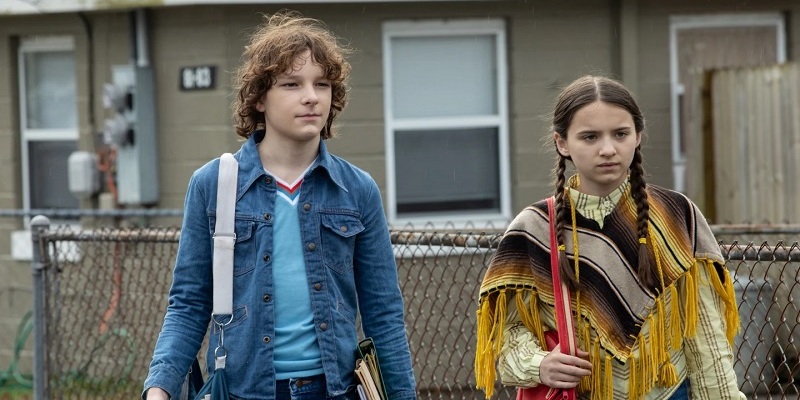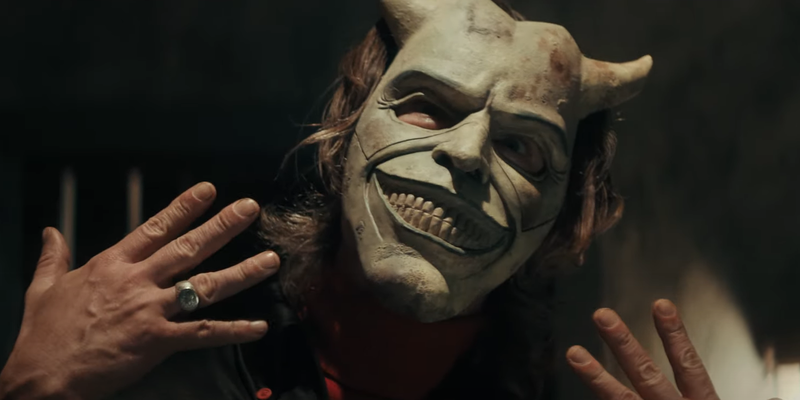
Review by
Eric Hillis
Directed by: Scott Derrickson
Starring: Ethan Hawke, Mason Thames, Madeleine McGraw, Jeremy Davies, James
Ransone

The directing and writing duo of Scott Derrickson and
C. Robert Cargill reunite with their
Sinister leading man Ethan Hawke for an adaptation
of Joe Hill's short story The Black Phone. This time Hawke really is a sinister leading man, with that most
avuncular of actors thoroughly convincing in a role that sees him cast
against type.
Hawke plays "The Grabber," a serial killer who has been abducting young
boys in the Denver of 1978. His sixth and latest victim is Finney (Mason Thames), who finds himself locked in a soundproof basement adorned with only
a mattress, a small bathroom and a disconnected rotary telephone.

Finney is surprised when the phone inexplicably rings, a phenomenon The
Grabber puts down to static electricity. "There's nobody on the other
end," he tells the kid. He's wrong. Finney begins receiving phone calls
from The Grabber's previous victims, who appear to be stuck in a sort of
limbo from which they can only escape by seeing their killer brought to
justice. Using a series of cryptic clues from his correspondents in the
after-life, Finney plots his escape. Meanwhile his kid sister Gwen (Madeleine McGraw), who inherited her late mother's psychic powers, experiences a series
of dreams that seem to hint at Finney's whereabouts.
The Black Phone is set in the 1970s for some very
specific reasons. The most obvious is that it eliminates the
storytelling inconveniences of cellphones and the internet, but it also
takes us back to a time before serial killer John Wayne Gacy had been
revealed as a children's entertainer who dressed as a clown, inspiring
coulrophobia in subsequent generations of kids. The Grabber is clearly
inspired by Gacy – he too is a children's entertainer, though his
white-face and black hat visage are far more outwardly sinister, not to
mention the black balloons he incorporates into his abduction
shtick.

The original short story is penned by the son of Stephen King, whose
influence is all over The Black Phone. The Grabber owes as much to Pennywise as to any real life killer, and
there are quite a few shots in the film that could have been lifted
directly from the recent two-movie adaptation of King's It. With child protagonists battling a monster of sorts, it's easy to see
why The Black Phone was greenlit following the success of
those movies.
King's stories are known for their depictions of cruelty among
children, something that's taken to ridiculous heights here. The kids
here are constantly fighting, but in such an over-the-top fashion – all
karate kicks and suplex moves – that it has more in common with a
professional wrestling bout than a schoolyard brawl. The violence gets
improbably vicious, with kids carving each other up with flick knives,
bashing heads in with rocks and kicking young girls in the head. I grew
up around some pretty rough kids in the '80s, but nobody would dream of
striking a girl, let alone giving her a swift boot to the noggin.
The silliness of these scenes detracts from the grimness of the central
plot, which really is grim. While the film steers clear of any mention
of a sexual nature to The Grabber's crimes, it's impossible to think of
him as being motivated in any other way, particularly when he spends so
much time with his shirt off, wielding a belt in readiness for his
latest round of torture. This level of darkness means
The Black Phone can't really be viewed as "fun," but its
sillier elements make it impossible to take seriously.

Those sillier elements include a subplot involving The Grabber's
amateur detective brother (James Ransone). It's played as broad
comedy, which really jars in a movie about child abduction and murder.
Then we have Gwen's psychic powers, which the film treats in such a
slapdash manner that her final revelation comes off as little more than
a storytelling convenience. It's also laughable how much stock the local
police put in this little girl's dreams.
It's a shame that there's so much nonsensical clutter in
The Black Phone, as in its best moments (most of which occur in the darkness of The
Grabber's basement and surrounding home), Derrickson displays a talent
for crafting a tense sequence. There's one escape attempt that will have
you digging your nails into your armrest. Hawke is genuinely unnerving
as the villain, using his physicality and stature to add to the threat
he poses to his young potential victim. But those moments are few and
far between in a movie that too often plays like a 1970s stranger danger
afterschool special on steroids.

The Black Phone is on Netflix UK/ROI now.
